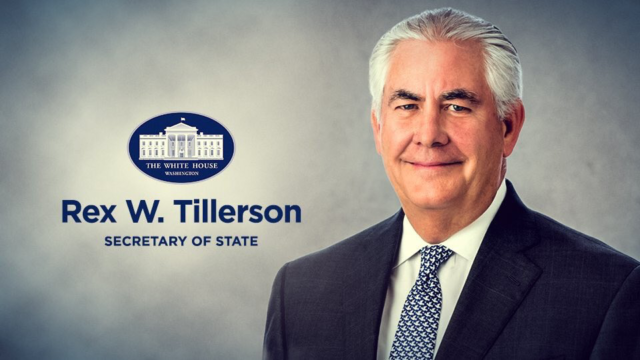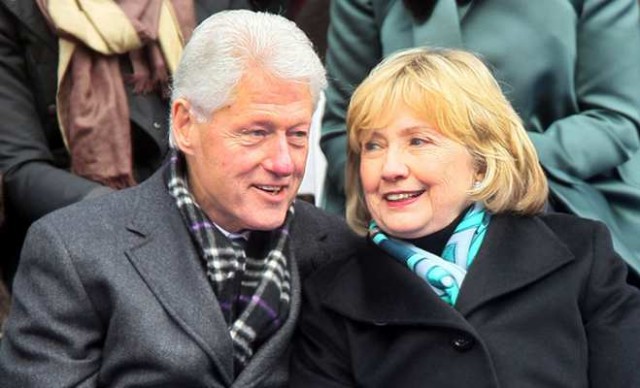Rex Tillerson is neither a yes man nor will he be boxed in on U.S. foreign policy
In a The Daily Signal article titled “9 Issues Discussed at Rex Tillerson’s Confirmation Hearing to Be Trump’s Secretary of State” Josh Siegel reported on the confirmation hearing of U.S. Secretary of State designate Rex Tillerson.
Reading Siegel’s article I came away with two impressions of Mr. Tillerson, first he will not be boxed in and second he is not a yes man. How refreshing.
First let’s look at Tillerson as a man who will not be boxed in when it comes to U.S. foreign policy. Siegel reported:
Sen. Marco Rubio, R-Fla., who ran for president against Trump, pressed Tillerson on whether he backs the assessment of U.S. intelligence agencies about Russia’s election-year hacking.
“Do you believe during the 2016 presidential campaign that Russian intelligence services directed a campaign of measures involving the hacking of emails, the strategic leak of emails, the use of internet trolls, and dissemination of fake news to denigrate a presidential candidate and undermine faith in our election process?” Rubio asked.
Tillerson described the findings by the intelligence agencies as “clearly troubling,” and called cyber attacks from foreign actors such as Russia “the greatest and most complex threat” facing the country today. He labeled Russia’s annexation of Crimea to be “illegal” and proposed tougher measures to combat the Kremlin’s invasion of eastern Ukraine, vowing that he would advocate providing Ukrainian soldiers with weapons.
But Tillerson expressed hope that he could help improve relations with Russia, potentially seeking to ally with it in areas of common interest even if America “will not likely to be ever friends with the Kremlin.”
“Dialogue is critical so these [issues] don’t spin out of control,” Tillerson said. “We need to move Russia from adversary always to partner at times.”
Tillerson clearly understands that Russia, and many other countries, act in their own self interests and against the interests of the United States. His reply was measured in that he understood that cyberwarfare is a national security threat, that invading another country is wrong and both must be punished. However, diplomacy is not just about jumping into a hot or cold war, as Senator’s Marco Rubio, John McCain and Lindsey Graham seem to want. Rather it is about pressuring those who would do us harm using all means available. The above interaction shows the sophistication of Tillerson, a man who thinks outside the box. Tillerson’s statement, “We need to move Russia from adversary always to partner at times” is that of a man who understands Russia more than some members of the U.S. Senate, Republicans and Democrats alike. Again, refreshing.
Tillerson is not a yes man for President-elect Trump either. Siegel noted:
In the presidential campaign, Trump questioned the NATO alliance, and said members need to do more to earn the U.S.’ support.
Tillerson expressed a stronger commitment to NATO, promising to follow Article 5 of the treaty that enshrines the principle that an attack against one member is an attack against all.
“The Article 5 commitment is invaluable and the U.S. will stand by the commitment,” Tillerson said.
He also expressed concern for Baltic states that worry about Russian incursion on their borders.
“Our NATO allies are right to be alarmed about a resurgent Russia,” Tillerson said.
[ … ]
In another contrast with Trump, Tillerson did not say he explicitly opposes the Obama administration’s Trans-Pacific Partnership trade deal.
“I do not oppose TPP, but I share some of Trump’s concerns that it doesn’t fully support American interests,” Tillerson said.
[ … ]
Echoing Exxon Mobil’s evolving calculus on climate change, Tillerson said he recognized the threat of a warming planet, and that the U.S. should “be at the table” in coming up with solutions to limit greenhouse gas emissions.
If confirmed, he said he and others in the Trump administration would review the 180-country Paris climate change agreement before deciding whether to remain party to it.
“It’s important that the United States maintain its seat at the table with the conversations around how to deal with the threats of climate change,” he said.
As chief of Exxon Mobil, Tillerson publicly backed a tax on carbon in 2009, and expressed support for the Paris Agreement in 2015.
Yet, late in the hearing, he seemed to downplay the threat of climate change.
“I don’t see [climate change] as the imminent national security threat as perhaps other do,” Tillerson said.
Tillerson will, on some issues, present a President Trump with differing views. That is healthy. It shows that President-elect Trump is filling his cabinet with quality people who think differently than him and provide opposing views. Once again, refreshing.
Donald Trump’s selection says as much about the President-elect as it does about Mr. Tillerson. There is a new way of thinking about foreign policy and a fresh approach that is pro-U.S. interests.
After reading Mr. Tillerson’s testimony it is clear he will not be foreign a policy rubber stamp as were former Secretaries Hillary Clinton and John Kerry and that he will think outside the foreign policy box of the Obama administration.
Very refreshing indeed.
RELATED ARTICLE: Secretary of State Nominee Tillerson Criticizes U.S. Decision to Abstain from UN Israel Vote


